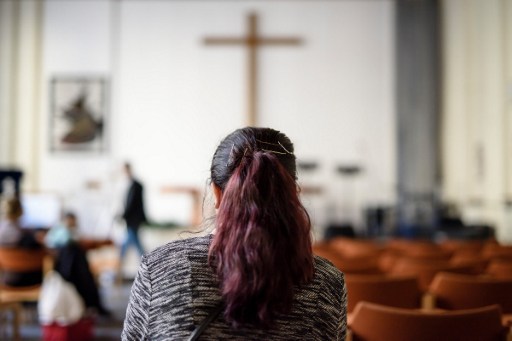In Germany, some Muslim refugees convert to Christianity

Afghan refugee Faridah visits a course preparing her to convert into christian confession by baptism in Berlin, on October 23, 2016. AFP PHOTO
BERLIN—Clad in white at a Berlin church, asylum seekers Saeed, Veronica, Farida and Matin were just about to become Christians on a recent Sunday.
“Do you believe from the bottom of your heart that Jesus Christ is your Lord and Savior, and will you follow him every day of your life?” Pastor Matthias Linke asked them. “If so, say yes.”
All four replied with a frank “Ja”, to the enthusiastic applause of the faithful at the Free Evangelical Church, and were plunged head-to-toe into a baptism basin.
“I am very, very happy, I feel… how to say?”, said 20-year-old Iran native Matin right after his baptism, placing his hand on his chest.
Muslim refugees have recently been taking the same step throughout Germany, where nearly 900,000 asylum seekers arrived in 2015.
Article continues after this advertisementREAD: Some 10,000 migrants flood into Germany, enjoy warm welcome
Article continues after this advertisementChurch leaders have confirmed a notable, though not huge, trend upward, but have not provided statistics.
“In our diocese, there are several groups of refugees who are preparing for baptism, and there are more and more requests,” said Felix Goldinger, a Catholic priest in Speyer, southwestern Germany.
Many come from Iran and Afghanistan, some from Syria or Eritrea, he said.
“I am currently handling a group of 20 people but I do not know how many will go through until baptism,” he told Agence France-Presse.
Over the course of their preparations, which last nearly a year in Goldinger’s diocese, potential converts are encouraged to weigh their own motivations.
“During this period, it is important that they examine their original religion, Islam, and the reasons why they want to change it,” he said.
“We are obviously pleased that people want to be baptized, but it is very important for us that they are sure of their decision.”
Goldinger said that “many people recall what they have experienced in their country”, including “terrorist acts committed in the name of religion. They see Christianity as a religion of love and respect for life.”
In Iran, said Linke, many had been in contact with unrecognized churches in the Islamic republic, where conversion is prohibited, and then had to flee.
Other refugees met Christians on their journey to Europe.
This was the case for Saeed, a 31-year-old aeronautical engineer who spent four months in Turkey with a Christian and then became interested in his religion. Like fellow new convert Veronica, Saeed is from Afghanistan.
Reading the Bible “helped in times of trouble,” he says.
It was in Greece, recalled Matin, that he first came in touch with the Christian faith. After he arrived in Germany, he approached the Free Evangelical Church through his German friends.
His sister Farida followed him and they began preparations — in German and Farsi — for baptism.
Farida said she “was looking for a church” and wanted to choose her religion “in complete freedom”.
“This is a very important reason to become a Christian,” said Linke.
Among refugees who adopt Germany’s dominant religion, he said, “there is a strong desire to decide for themselves, in a free and personal way, the direction of their lives”.
Afraid for families
Churches concede that some conversions are motivated by a desire to integrate into German society, or even by the belief that they will increase their chances of gaining political asylum.
READ: Refugees look to job fair for first step in German integration
Countries that send Muslim converts to Christianity back to their homelands put them potentially at great risk.
Apostasy or blasphemy can be punished with jail or death sentences in some Muslim countries, among them Iran, Mauritania, Saudi Arabia and Afghanistan.
For jihadist groups such as the Islamic State, conversion is also a punishable sin.
“There are refugees who think that if they convert, it will be easier for them to stay here, but it is not systematic,” Goldinger said.
“Do they change religion in order to be able to stay in Germany? This is an important issue for the authorities,” said Linke, who is often consulted by the state Office for Migration and Refugees.
“I have no guarantees, I can only ask them: ‘do you really believe with all your heart?’ After their baptism, most of them live as Christians and come to church,” he added.
Outside their new community, the converts nonetheless usually try to remain discreet.
“They may face difficult situations in refugee homes, where the majority are Muslims,” said Thomas Klammt, in charge of migration issues at the Union of Free German Evangelical Churches.
“They may also be afraid for their families left behind in their country of origin.”
Matin said he stays in contact with relatives back home — especially his mother, who had “accepted” his willingness to convert.
“She calls me every Sunday to ask if I have been to mass,” he said, laughing./rga